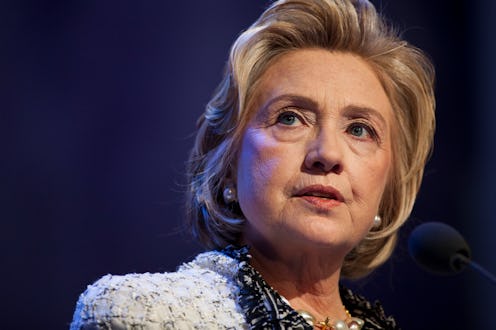News
Stop Asking Hillary Clinton How Much She's Worth
Hillary Clinton is fielding a seemingly never-ending stream of questions these days, and the one I'm sick of hearing is, "What is Hillary Clinton's net worth?" On Tuesday, the Washington Post ran an article headlined "Hillary Clinton still hasn't found a good answer to questions about her wealth," and perhaps the reason is simply that it doesn't matter.
In his article, Chris Cillizza berated Clinton for not having "a clearer answer" to inquiries about her wealth. It is "hard for [Cillizza] to believe that Clinton" has not carefully rehearsed a perfectly crafted response to conservative critics and other members of the media who have recently come down hard on Clinton for her self-proclaimed "inartful" comments about her family's wealth.
And Cillizza may be right — perhaps Clinton should have a strategist, speech writer, or other PR personnel draft an eloquent quip about how much money she and Bill have. Or maybe she should carry around a copy of her tax return to shove in the face of anyone's who's curious — how's that for transparency? After all, as Cillizza points out, "those questions [about her wealth] will keep coming."
But as troubling as Clinton's apparent inability to craft a consistently satisfactory answer is to Cillizza, even more troubling is the media's obsession with having Clinton answer the question at all.
In 2012, the Washington Post ran a very different article about wealth in politics, this time about then-presidential hopeful Mitt Romney. This piece was headlined "Mitt Romney is worth $250 million. Why so little?" For reference, in Cillizza's article, he notes that Clinton's average estimated net worth is around $15.3 million, or about 6 percent of Romney's worth.
So why the different reaction to the same issue? Could it be that it is Clinton's status not only as a wealthy individual but a wealthy woman that is so unappealing to many?
Politicians, as a whole, are a wealthy bunch. They have to be — campaigns aren't cheap, and they're only getting more expensive. Moreover, once in office, connections abound, and opportunities to increase wealth beyond the comparatively modest congressional salary of $174,000 seem to appear at every turn.
In January, the Center for Responsive Politics released a report that revealed that the majority of Congress, or 268 of the 534 members of the legislative branch, were millionaires. The median total in assets for congressmen and women was an astounding $1,008,767. A recent study by the Russell Sage Foundation found that the average net worth of the typical American household in 2013 was $56,335.
So yes, politicians are rich. And even Hillary Clinton, with her $15 million or so, is not a terrible outlier. In fact, the wealthiest member of Congress, Rep. Darrell Issa (R-CA), has an estimated $464 million in assets. But politicians are also mostly men. As a whole, women make up just under 16 percent of Congress.
While many politicians add to their wealth by making strategic investments by way of their political connections, Hillary Clinton has made the majority of her money through her book sales, her speech appearances, and other public engagements. But her money, made not through secretive or exclusive agreements and arrangements, seems dirtier than that of her colleagues.
Unlike many presidents and presidential hopefuls, neither Hillary nor Bill Clinton came from outlandishly wealthy backgrounds, nor married into them. Certainly not to the extent of say, George W. Bush and company, John F. Kennedy, or John Kerry, who married into the Heinz fortune. The Clintons, however, have received nearly unparalleled criticism for their self-made success, especially following Clinton's claims of being "dead broke" upon leaving the White House.
But as inelegant and potentially unfounded as such a claim may have been, how does Clinton's wealth affect her candidacy for the presidency? I could not find a single serious presidential candidate in 2012 who was not a multimillionaire (which is itself an issue) and yet, few have been questioned about their wealth as frequently or as accusingly as Clinton. The only difference, it seems, is that she is a woman.
A BMO Private Bank study in 2013 showed that while around 30 percent of the nation's millionaires were women, only half of them were self-made — the rest either married into or inherited their fortunes. Hillary Clinton, then, is among the 15 percent. And in the male-dominated field of politics in a nation that has yet to elect a female president, Clinton's presence as a strong, intelligent, and, yes, wealthy woman is intimidating.
In her career, Clinton has broken the glass ceiling approximately ten billion times over, from being the first female partner at her law firm, to being the first first lady with a postgraduate degree, to being the first first lady to serve in the Cabinet. The woman deserves to make some money — she's earned it.
So maybe Clinton shouldn't be uncomfortable answering questions about how much money she has. Or maybe we should just care less, because in the end, it doesn't really matter.
Getty Images (4)
